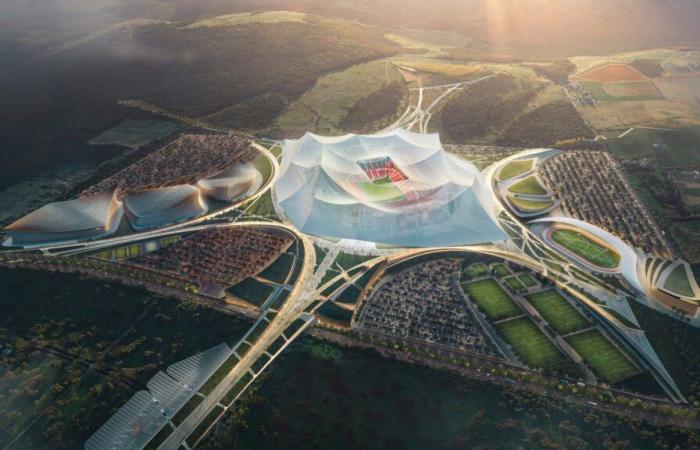
“The meteoric rise of Morocco on the international Football scene” is confirmed, indicated the New York Times, in a major report published on December 22. “The Shereef kingdom no longer hides its ambitions: it wishes to become a “world reference in football”. At the dawn of its co-organization of the 2030 World Cup with Spain and Portugal, the country is deploying a series of initiatives to establish its domination on the African continent.we mentioned.
“This success is based on a carefully developed strategy. Morocco understands that football goes well beyond a simple game. It constitutes a strategic lever for “economic and diplomatic development”. Through massive investments in sports infrastructure, targeted training of young talents and the organization of large-scale events, the country is attracting foreign investors, stimulating its tourism and strengthening its international image. Under the leadership of Fouzi Lekjaa, president of the Royal Moroccan Football Federation, the government has put in place an “ambitious plan” to propel the country to the top of world football. The results are there: new academies are being created, stadiums now meet international standards and national teams are recording historic successes.according to the well-documented report.
A network of influence in Africa
Morocco does not just shine on the national field, it has also established itself as a key player within the Confederation of African Football (CAF). By forging alliances with other nations on the continent, investing in joint projects and supporting development initiatives, the kingdom is weaving a strong network of influence. “The decision to install the first permanent FIFA headquarters in Africa in Marrakech”indicates the New York Timesis a striking example of the international recognition of Morocco and its driving role in the evolution of African football.
Unprecedented megaprojects
“Just outside Casablanca, Morocco's economic port city, a new stadium is under construction: the Grand Stade Hassan II, with a planned capacity of 115,000, making it the largest football stadium in the world. world and a symbol of Morocco's growing status as an emerging power in world football. Many in the country have not lost hope of seeing this stadium host the final of the tournament. Another important step in this development project concerns the future of football in Morocco: before the 2030 World Cup, the country will organize the next five editions of the Under-17 Women's World Cup, each year from 2025 In April, the capital Rabat will also host the next World Football Summit, bringing together industry leaders and experts.according to the same source.
Morocco, although geographically on the periphery of Africa (eight nautical miles from Spain), has become a real nerve center for continental football. This position was reinforced by the announcement of the opening of the first permanent FIFA headquarters in Africa, in Marrakech, and the establishment of regional offices in Africa, notably in Senegal and Rwanda. This advance closely follows the announcement by the Moroccan Ministry of Tourism that the country surpasses Egypt as the most visited tourist destination in the Maghreb. The ministry predicts football will drive interest and economic growth, with a target of 17 million tourists by 2026 and 26 million by 2030.
Stubbornness pays
Before winning the organization of the 2030 World Cup, Morocco had tried five times without success to obtain the honor of hosting the competition, since 1994. It was only after a strategic turnaround that it was able to reposition itself, placing emphasis on football as a political priority and making substantial investments in its sports infrastructure.
“Thanks to an investment of 80 million euros in sports infrastructure and a strategic positioning on the continent, Morocco has seen its football ambitions come to fruition, as have its international performances. After reaching the semi-finals of the 2022 World Cup, the country appears poised to establish itself as a global football leader, supported by a talented diaspora and state-of-the-art infrastructure, such as the World Cup football academy. 65 million dollars dedicated to King Mohammed VI, whose facilities are considered among the best in the world.according to the prestigious American newspaper.
“In 2022, Morocco becomes the first African or Arab nation to reach the semi-finals of the World Cup. It was widely hailed as one of publishing's great stories, capturing imaginations far beyond the continent, but the feat was no accident (…) Last summer, a deal was reached signed with the football federation and private partners to create, according to a press release issued by the OCP and the government, a national training fund dedicated to the professionalization of training centers and the promotion of young talents. it was reported.
In this perspective, “Morocco intends to demonstrate to the rest of the world what it is capable of accomplishing, by using football not only as a diplomatic instrument, but also as a vector of growth and affirmation of its regional and international power. Far from being content with its role as a simple spectator on the world stage, the kingdom has been able to use the strengths of its geography and its natural resources to position itself as a key player, particularly in the fields of economy and sport.
Football has become one of the main levers of this ambitious strategy. By investing massively in modern infrastructure, supporting the emergence of local talent, and attracting foreign investors, Morocco is gradually transforming sport into a real economic engine. The construction of state-of-the-art stadiums, the creation of training academies, and the organization of high-level competitions help to equip the country with the necessary equipment to host global events and to compete with the major footballing nations.
Morocco has also forged an image of a serious and resolute country, capable of playing a pioneering role within the Confederation of African Football (CAF). Under the leadership of Fouzi Lekjaa, “the Moroccan argument was able to assert itself forcefully, based on a pragmatic vision of long-term development. This change in direction allowed the country to overcome the obstacles that stood in its way, including temporary isolation on the continental stage. Through this approach, Morocco reaffirmed its desire to join the elite of African and world football, and proved that it was now ready to assume its role as a major player.
In conclusion, “if Morocco continues on this momentum, by combining sporting performance, economic vision and diplomatic strategy, it could well position itself as a model for other nations in the region. The 2030 edition of the World Cup, which he will co-organize, will probably mark the culmination of this ambitious project, testifying to the dynamism of the kingdom and its ability to transform challenges into prospects.





